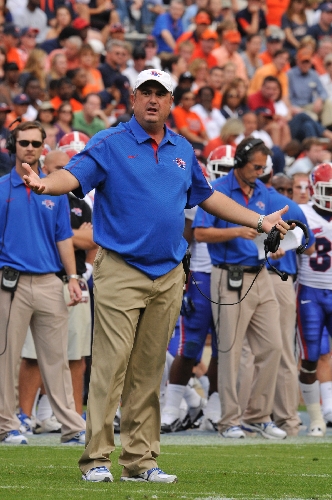Dykes builds offensive machine
From his father, Sonny Dykes learned the importance of organization and relating to players.
From Mike Leach, Dana Holgorsen and Hal Mumme, Dykes learned the intricacies of developing a high-powered passing game.
From Mike Stoops, he learned how to include a strong running game with such an attack.
Coaches, probably especially in football, are an amalgam of those who have influenced their fundamental beliefs.
Dykes has taken those influences and in three seasons as coach at Louisiana Tech - after stops as offensive coordinator at Arizona and co-coordinator at Texas Tech - has built one of the nation's scariest offenses.
The Bulldogs (4-0) enter Saturday's 4 p.m. PDT game against visiting UNLV (1-4) with an offense averaging 52 points, 282.8 yards passing and 216 yards rushing per game. They are 27-point favorites.
"It's been a lot of different systems kind of put together that's become an offense that we feel pretty good about," Dykes said.
Louisiana Tech's offense draws lofty comparisons, deservedly so after scoring 56 points at Houston and against Rice, 52 at Illinois and 44 last week at Virginia.
It's an offense that's difficult to stop once it gets rolling. Virginia led 24-10 midway through the second quarter before the Bulldogs hit the Cavaliers with a 34-point surge.
And Louisiana Tech moves fast. UNLV defensive coordinator J.D. Williams compared the Bulldogs to Oregon's lightning-quick style. Louisiana Tech has nine scoring drives of a minute or less.
"I think they try to average a play every 21 seconds or something like that," Williams said.
Dykes, 42, grew up in a football household. His dad, Spike, had a record 82-67-1 in 13 seasons at Texas Tech. He beat chief rivals Texas and Texas A&M a combined 11 times.
"Most of the stuff I learned from him was how to deal with people and how to try to run a football team, things that are really important but aren't necessarily 'Xs-and-Os' type things," Dykes said. "Being a head coach is really about managing people, figuring out what buttons to push and trying to pay attention to the stuff that matters and not worry about the stuff that doesn't matter.
"That's hard to do sometimes, but the great thing was I had a chance to grow up watching somebody do that."
When it came to developing his offensive philosophy, Dykes' first significant influence was Mumme, who hired him in 1997 as a graduate assistant at Kentucky. Dykes returned there in 1999 as receivers coach and special teams coordinator.
Mumme ran the "Air Raid" attack that relied on short passes to an array of wide receivers and running backs. Leach was Mumme's offensive coordinator and quarterbacks coach in 1997 and 1998.
Spikes followed Leach to Texas Tech when Leach got his first college head coaching job. Spikes was there from 2000 to 2006 as the receivers coach, with the title of co-offensive coordinator added in 2005.
Leach, now the coach at Washington State, turned Texas Tech into a high-scoring offense with his hard-to-stop and fun-to-watch spread formation.
Holgorsen was on the staff, sharing coordinator duties with Dykes for two seasons before taking over on his own in 2007. Holgorsen now is head coach at West Virginia, which on Saturday beat Baylor, 70-63.
When Dykes was offensive coordinator at Arizona from 2007 to 2009, he learned from Stoops the value of the running element and the importance of sometimes eating up clock.
The various influences are apparent in Dykes' balanced and potent offense at Louisiana Tech. He is part of the national trend of putting offenses on the field that opposing defenses can't keep up with.
"People are going fast, and the tempos are getting faster," Dykes said. "As a result, there are more plays being run. The more plays you run, the more chances you have to score.
"It's takes a lot of the (defensive) scheme out of the game and puts it more on kind of a fundamental game."
Contact reporter Mark Anderson at manderson@reviewjournal.com or 702-387-2914. Follow him on Twitter: @markanderson65.






















